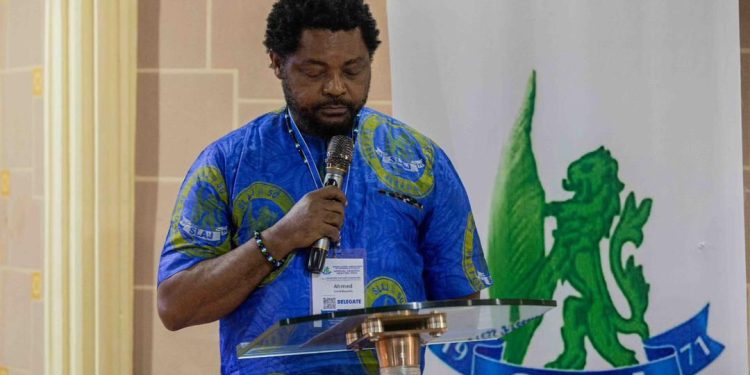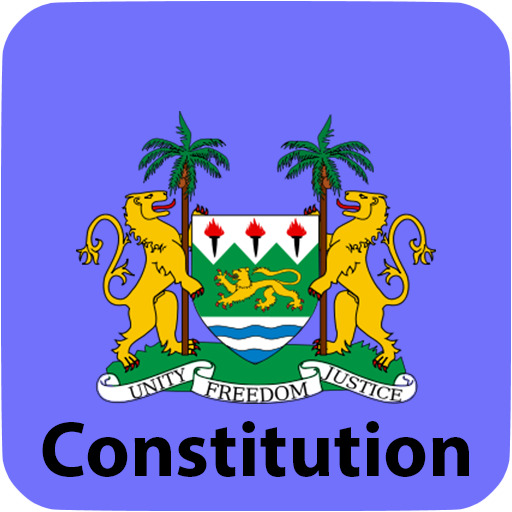By Mackie M. Jalloh
At the Sierra Leone Association of Journalists (SLAJ) Annual General Meeting (AGM) 2024, held in Freetown, journalists, legal minds, and key stakeholders from the media landscape gathered to confront the pressing challenges of the profession, and deliberate on a new constitution. With a focus on inclusivity, transparency, and strengthening the role of journalism in a fast-evolving media environment, the event signalled a crucial turning point for SLAJ as it charts the future of journalism in Sierra Leone.
In a bid to navigate through the global shift in media practices, and set new standards for journalism in Sierra Leone, SLAJ seeks to adopt a new constitution—one that reflects the challenges of the present and anticipates the needs of tomorrow. The event’s theme, “Charting the Way Forward: A New Constitution for an Inclusive and Stronger SLAJ,” underscored the need for the association to not only adapt to the changing landscape but to lead the charge in promoting integrity, inclusivity, and accountability across the profession.
The AGM kicked off with opening remarks from SLAJ President Ahmed Sahid Nasralla, who highlighted the importance of inclusivity in shaping the association’s future. Nasralla emphasized that inclusion should not be a mere slogan but a cornerstone of progress for SLAJ. He stressed the importance of engaging all sectors of journalism—particularly marginalized voices such as women, journalists in rural areas, and media practitioners who have often been side-lined.
“Inclusion is not just a slogan; it is a fundamental pillar of progress and a vital necessity for our association if we are to remain relevant, resilient, and forward-looking in this ever-changing media landscape. Our strength lies in the diversity of voices we represent,” Nasralla said. He further outlined that a strong, inclusive SLAJ would be better equipped to fulfil its mission of serving the public with truth and integrity.
He noted that the new constitution presents a unique opportunity to restructure SLAJ into an organization that is transparent, democratic, and stronger—one where every journalist, regardless of their background or gender, feels valued and heard. As the media faces rapid technological advancements, Nasralla argued that the constitution must be adaptive, focusing on growth in diversity, representation, and professionalism.
Following Nasralla’s remarks, Hon. Justice A.M. Bagurah, a Justice of the Supreme Court of Sierra Leone, delivered the keynote address, offering legal and ethical perspectives on the challenges facing journalism. Justice Bagurah acknowledged the significant role SLAJ has played in promoting press freedom and the responsibility it carries to uphold the integrity of the profession. While cautioning himself due to his judicial role, he addressed the critical need for a constitutional framework that accounts for the rapid evolution of the media landscape.
“Laws must evolve, to be proximate to social, economic and scientific evolutions,” Justice Bagurah stated. He acknowledged the draft constitution’s pivotal role in positioning SLAJ as a body that embodies inclusivity, accountability, and ethical standards, while simultaneously adapting to the new realities brought about by digital and technological advancements.
Justice Bagurah outlined three core challenges currently facing journalism in Sierra Leone and globally: the impact of digital technology on the dissemination of information, the economic viability of traditional journalism, and the safety and security of media practitioners. He noted that the rise of social media has democratized access to information, but also exacerbated the problem of misinformation and disinformation. Bagurah emphasized that SLAJ must rise to the challenge by promoting professionalism in an era where journalistic standards are increasingly being diluted by online falsehoods.
The economic strain on traditional media outlets, worsened by the dominance of global tech giants in digital advertising, has threatened the survival of independent journalism. Justice Bagurah warned that this trend poses a significant threat to democracy, as weakened media institutions may no longer be able to hold the powerful accountable. As SLAJ moves forward, he argued, it must address the economic realities facing its members, ensuring that the livelihoods of journalists are protected without compromising the independence of the press.
Finally, Justice Bagurah highlighted the critical issue of safety and security for journalists, especially in a country where freedom of the press, while legally protected, is often under threat from violent reprisals and intimidation. He stressed that SLAJ’s new constitution must include provisions that address the professional hazards of journalism, ensuring that members can carry out their work without fear of violence or retribution.
A major highlight of his address was the need for inclusivity within SLAJ itself. Justice Bagurah proposed that the new constitution should include affirmative action policies for women, youth, and persons with disabilities (PWDs) in leadership positions within the association. He argued that while merit-based systems are essential, affirmative action serves as a necessary tool for addressing structural inequalities in emerging democracies like Sierra Leone.
“An inclusive SLAJ is one where all voices are heard, and all members feel empowered to participate fully in the association’s activities,” he said, lamenting the absence of an explicit gender policy in the draft constitution. He called for greater efforts to ensure that female journalists, often underrepresented and marginalized, have equal access to leadership roles and professional development opportunities.
The AGM also focused on internal governance and accountability within SLAJ. Both Nasralla and Justice Bagurah stressed that the new constitution must establish clear guidelines to ensure transparent leadership, financial management, and decision-making processes. SLAJ, they said, must serve as a model of good governance for the broader media community, embodying the ethical standards it expects from its members.
Reflecting on SLAJ’s role in defending press freedom, Justice Bagurah underscored the historic repeal of the Criminal Libel Law in 2020 as a landmark achievement. However, he reminded the audience that the fight for press freedom is far from over. He urged SLAJ to remain vigilant against any new threats to the freedom of journalists and suggested that the new constitution should include provisions for legal protections, such as a defence fund, for members facing legal battles due to their reporting.
The SLAJ AGM 2024 was not just a gathering to review constitutional provisions—it was a call to action for the future of journalism in Sierra Leone. The discussions held will shape not only the association but the profession as a whole, reaffirming SLAJ’s commitment to inclusivity, accountability, and the defence of press freedom as pillars for the advancement of democracy.
As the deliberations continue, the SLAJ membership must decide how to embrace these new frameworks for the betterment of journalism, ensuring that the profession remains resilient, independent, and dedicated to serving the public good. The adoption of this new constitution represents a bold step in that direction.













